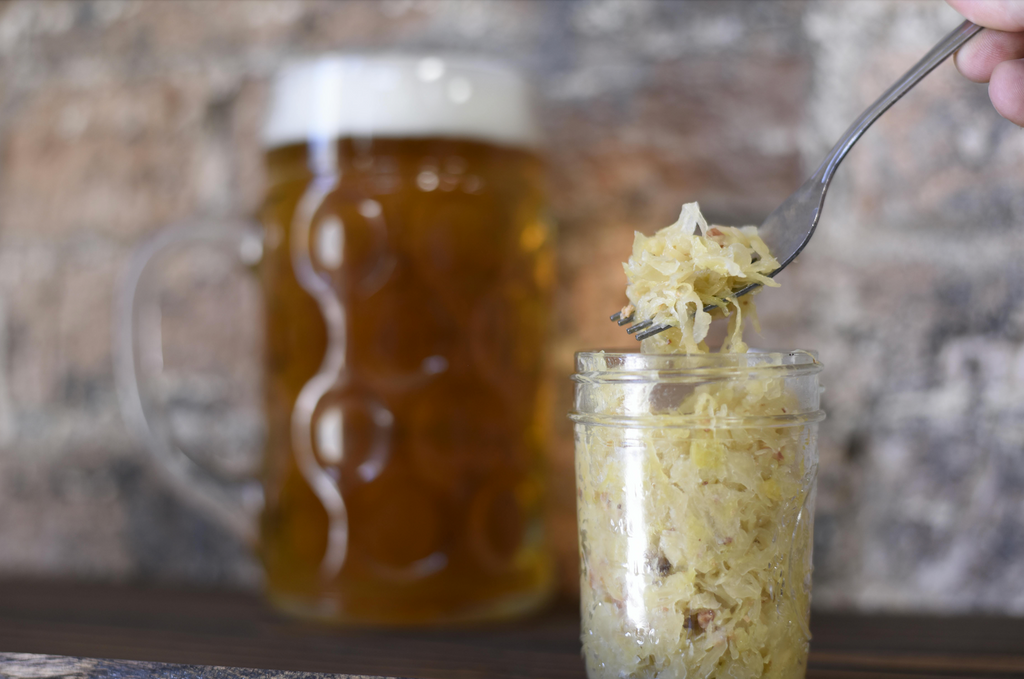Sauerkraut and fermented and probiotic food have become a byword for gut health-friendly probiotics. But have you considered the link between sauerkraut and Vitamin C? And how important that link is to your health?
Despite its name, sauerkraut (“sour cabbage” in German) is thought to have originated in China over 2,000 years ago. There, as elsewhere in the world, the fermenting process was used to store excess vegetables for the winter.
It’s only recently that Western science has recognised the health and wellness properties of fermented foods, including sauerkraut. Most remarkably has been the scientific discovery of the richness of probiotics that develops through the fermentation process. And the vital role these bacteria play in our health.
Every month it seems, we hear of how new studies which show the influence of gut health on our mental and physical health and wellbeing.
As fermenting guru Sandor Katz says in his book Basic Fermentation,
“…we humans are in a symbiotic relationship with these microscopic living beings. Without them life could not be sustained.”
Sauerkraut and Vitamin C
But it’s the link between sauerkraut and Vitamin C that we’d like to cover in this article. So let’s begin by outlining the importance of Vitamin C to our health and then explore its relationship with sauerkraut.
Why is Vitamin C important for our health and wellbeing?
Vitamin C, also known as ascorbic acid, is one of the key essential nutrients in our diet. The body cannot make the vitamin and must, therefore, ingest it through food.
We need vitamin C to make collagen, the flexible protein that maintains the connective tissue in the body. This is vital for the proper functioning of our immune systems.
Vitamin C helps us to maintain good health in several ways. As well as strengthening our immune systems, it can protect our cardiovascular system, keep our skin supple, and help our bodies absorb iron.
Other benefits include decreasing the risk of developing urinary tract infections, protect against the damage free radicals cause in the body, help increase bone density and help protect against macular degeneration in elderly people.
A recent meta-study of over 100 studies conducted over a decade found many benefits of Vitamin C to our health. According to study researcher Mark Moyad, MD, MPH, of the University of Michigan, quoted in this article in WebMD,
“Vitamin C has received a great deal of attention, and with good reason. Higher blood levels of vitamin C may be the ideal nutrition marker for overall health,” he says. “The more we study vitamin C, the better our understanding of how diverse it is in protecting our health, from cardiovascular, cancer, stroke, eye health [and] immunity to living longer.”
Where can we find Vitamin C in foods?
The following are all good sources of Vitamin C.
Red pepper; orange; grapefruit; kiwifruit; green pepper; broccoli; strawberries, tomatoes and cabbage.
Sauerkraut and Vitamin C

At around 30 mg per serving, cabbage by itself is already an excellent source of Vitamin C. However, the fermenting process used to make sauerkraut increases Vitamin C content exponentially.
According to a study conducted by a team at Cornell University, scientists measured the range of antioxidants and vitamin C in sauerkraut were from 57 to 695 mg. Raw, fermented red cabbage was shown to have the highest levels of Vitamin C with around 700 mg per serving.
(At Gutsy Ferments, red cabbage features heavily in our sauerkraut. Our Pepperberry Kraut is a delicious and nutritious example.)
Vitamin C and the immune system
The link between Vitamin C and maintaining a properly functioning immune system is crucial for our health. However, the current COVID-19 virus has brought the care of our immune systems into sharp focus. It is important to note that increasing our intake of Vitamin C is far from a cure for the coronavirus, nor does it replace guidelines on social distancing and self-isolation to restrict the spread.
Always check with your health professional for advice about changing your diet.
It is important to buy raw sauerkraut that hasn’t been pasteurised. The pasteurising process will not only kill the good bacteria (the friendly bugs for our gut) on the sauerkraut, but it will also significantly reduce nutrients, its important that these fermented and probiotic food stay in their unpasteurised state. These nutrients include Vitamin C.
According to a study published in the International Journal of Scientific & Technology Research, any heating of foods will cause a loss of Vitamin C.
At Gutsy Ferments we create delicious fermented and probiotic food and we make sure we deliver our sauerkraut to you raw and unpasteurised. We make our sauerkraut from fresh, organic local ingredients which have been fermented in oak barrels for at least four weeks and packaged in glass. No plastic residue!
Clearly, sauerkraut and Vitamin C have a special relationship. One that has many significant benefits for our health and wellbeing. Try our wildly fermented Vitamin C and probiotic-rich sauerkraut. Healthy and wonderful!




